Renewable energy has a number of benefits and disadvantages. The most significant of the benefits are the avoided carbon emissions and the energy-security benefits. The latter is more debatable - diversity is undoubtedly the key to security; on the other hand, the intermittent renewables, being unreliable, have some negative impacts on security too.
Whatever the pros and cons, one can say that in most regards one type of renewable provides similar benefits (per MWh) to another, and that if we were to distinguish between them at all, it would not be to favour intermittent technologies (wind and wave, in particular). Nevertheless, the Government treats the intermittent technologies very much more favourably than the alternatives.
In the case of onshore wind (which is treated four times more generously than landfill gas, a technology of similar costs and maturity), this is almost completely incomprehensible and unjustifiable. In the case of offshore wind and wave, the justification, such as it is, for generous support is that they are immature, and that generous support to bring on projects now will drive them down the "learning curve" in the belief that they will thus become economic.
The learning curve is a piece of economic mumbo jumbo. But let's pretend that it's not. I posted recently on offshore wind's apparent learning curve to date, which has been strongly upwards (i.e. the more we learn, the more expensive it turns out to be). Now the Government has released a report by Ernst & Young that was commissioned to support their decision to "band up" offshore wind in a review of the Renewables Obligation banding.
DECC don't appear to have made the document publicly available; perhaps even they and E&Y are too embarrassed to expose this drivel to public consideration. So I have attached it here.
The report includes the customary incantation of the "learning curve" mantra, in Appendix C: Industry learning. And indeed, assumptions about learning-curve benefits are included within E&Y's calculations of future costs.
So how much better do E&Y forecast that offshore wind will get as a result of the Government's generosity and the magical properties of "learning curves"?
Well, here is their projected curve for the cost of the turbines:
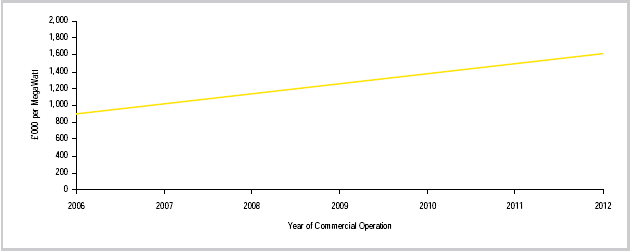
Oops. Well perhaps they are getting cheaper to put in? Here is E&Y's projection of foundation costs:
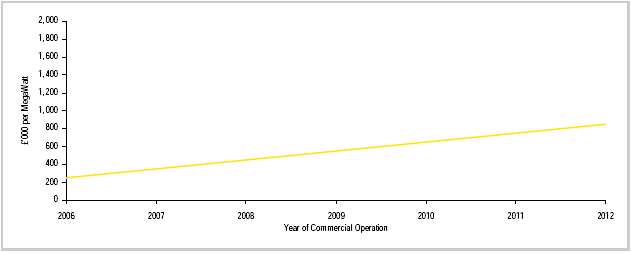
Never mind, maybe the electrical infrastructure is getting cheaper?

As E&Y note, "Since more recent projects are located further offshore they see higher electrical infrastructure costs than earlier near-shore projects." Oh dear. Anyone remember the cherry-picking effect, which I have repeatedly pointed out will counterbalance and often outweigh the learning curve?
In all E&Y project that the trend of capital costs will be:
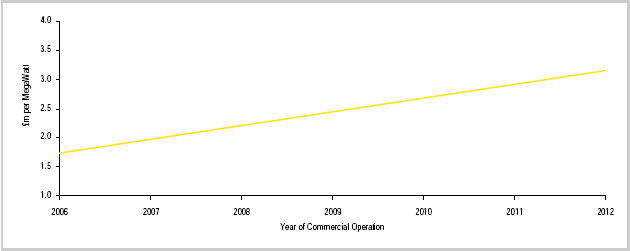
But capital costs aren't the be-all-and-end-all of project economics. Perhaps the operating costs are improving:
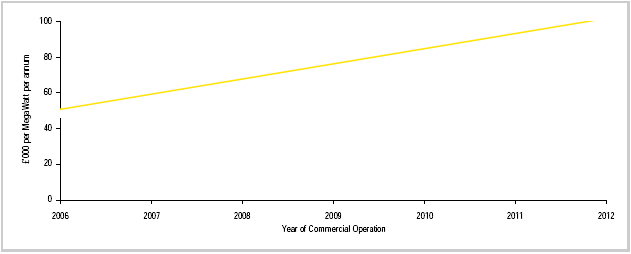
Last chance. Will the costs of repair and maintenance improve so much that they make up for all these other increasing costs?
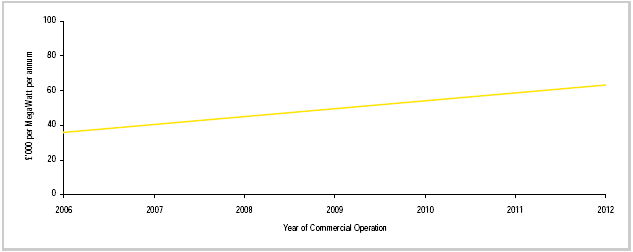
No. Everything about offshore wind is getting more expensive.
So remind me again. Just why are we planning to throw billions of pounds at this technology, and support it to a much greater extent than technologies that deliver the same or greater benefit, are more reliable and less difficult?
Is there any reason other than to provide yet another bung to the Government's corporate pals?
As a postscript, I have to admit that I got a figure wrong in my previous post on this subject. I generously allowed a load factor of 40% for offshore wind's output (i.e. it would produce 40% as much energy as it would if it ran at full power all the time). The industry used to claim around 45%, when it was arguing that it could deliver lots (rather than when it was trying to argue how poor it is). Everyone except the Government knew that was fantasy, but I thought 40% was a reasonably adjusted figure. Apparently not. Ernst & Young have been working for a while now on a figure of 35%. And in the most recent year for which we have figures (2007), the Renewable Energy Foundation's excellent analysis of ROC-Register data shows that the average offshore load factor was 27.1%, lower than the onshore average. I am sorry to have given a misleading impression that offshore wind might have some modest redeeming feature. [PPS: E&Y used 35% in their report supporting the consultation on banding the RO, but I now see that they are allowing 38-44%, depending on project, in this latest report. Don't know how this is justified, considering the performance demonstrated by REF. It all shows that claims that you can calculate what technologies need, rather than simply creating rational incentives and seeing what turns out, is stupid, illusory, and counter-productive. Government never has good-enough information or pure-enough motives for central-planning to be an effective option, whether that planning is implemented by literal command-and-control or through incentives targeted at calculated needs and outcomes.]
And another supplementary thought: E&Y's capital cost curve shows capital costs rising towards £3 million per MW. So how did the Government come to the figure of £9 billion they claimed would be invested to deliver the 1300 MW that they estimated the half-billion-pound bung would deliver?







